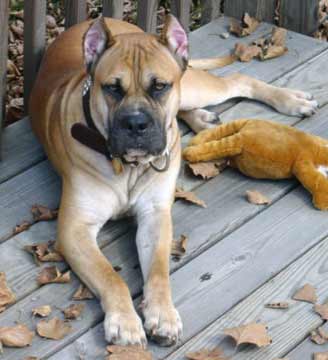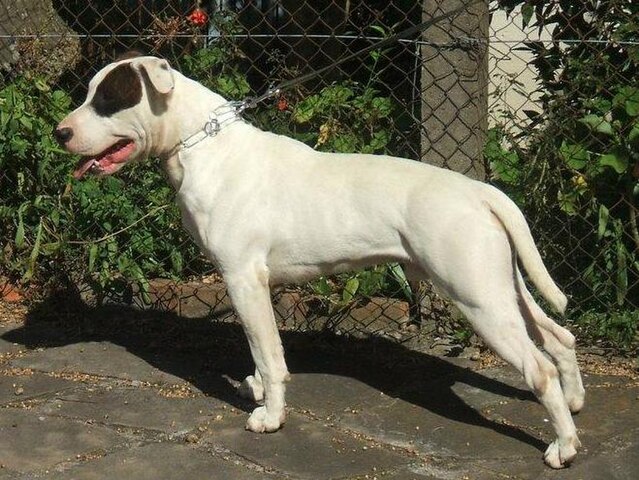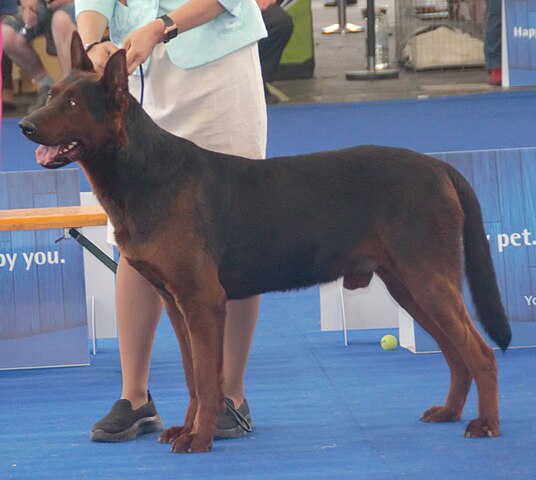The Bulldog is one of the most recognizable breeds of dogs and garners attention wherever he goes. They can be dignified when they feel like it but are also known for being silly. They are also very courageous – a throwback to when they were bred to square off against bulls and fight other dogs. While the Bulldog of the past was actually quite an aggressive animal, breeders have worked hard to quell that aggression and insert a docile and sweet nature in its place. Today, the breed makes a great family companion and gets along well with kids and other pets. As an added bonus, they tend to be quiet (aside from snoring and snorting).
Although short to the ground, the Bulldog is surprisingly heavy. The massive frame is one of their most recognizable features, along with their underbite and their front-heavy body. Weighing as much as 50-60 pounds, the breed can be difficult to pick up by small humans. Training them to walk up and down a ramp can be a valuable skill to teach – not only convenient for the owner’s back but potentially life-saving for the dog.
Bulldogs are not a very active breed (napping is a favorite activity), therefore they make great apartment dogs. This said, they do appreciate limited exercise. Getting out and walking in the fresh air is a great bonding event for both dog and owner. Just make sure to walk only when the weather is cooler (which might mean mornings or evenings) as Bulldogs are prone to overheating. The breed is so affected by the heat and humidity, in fact, that giving him regular outdoor access to a kiddie pool is not a bad idea. A few inches of cool water is all that he needs in order to cool down on a hot day – never throw him into a big pool as he can’t swim very well.
Because of their low energy and docile temperament, the Bulldog makes a great “starter dog” for an owner who has never before owned a dog. They are affectionate without being overwhelming, and not particularly demanding. That said, they do have more health risks than some other breeds which means that they aren’t a good match for someone with little money. Health issues include anything from allergies and skin issues to hip dysplasia and respiratory problems. Some dogs have sleep apnea, some have digestive issues… while others are completely fine. Vet bills have the potential for being higher and while many Bulldogs never develop any serious health conditions – others can end up needing costly treatments. At least supplies don’t need to be pricey! Get the best value for your money in terms of a kennel with the durable and affordable Petmate Vari Kennel – https://amzn.to/3B3CUE6 
Drooling is another concern for some people… the breed can get messy around the lip area. Otherwise they are generally clean and have an easy-care coat. It’s important to watch their food intake to keep them from getting fat. Although they are naturally heavy-set, they should never be so massive that they can barely walk. The extra weight will put unneccessary strain on their joints, and this breed is prone to joint issues as it is.
Bulldogs aren’t known for being easy to train. In fact, they are renowned for their stubbornness! They can also be difficult to motivate – you can’t train a dog by promising him a nap afterward. Despite these roadblocks, the breed can be taught obedience as long as the owner is patient and understanding. Once the dog has learned the command, he isn’t prone to forgetting it – it’s usually just dependent upon his mood as to whether he chooses to perform it! A good trainer must be able to work the dog through these stubborn phases and teach him that obedience is fun, yet not optional.
Despite their intimidating looks, Bulldogs are one of the friendliest dog breeds around. Because they love people so much, they enjoy meeting guests that come over to the house. They can be very social butterflies and often don’t mind a party! As such, they don’t usually make the most suitable guard dogs (although some make decent watch dogs, and others will come to their owners’ aid in an actual emergency).
Affiliate Disclaimer
As an Amazon Associate, I earn from qualifying purchases. This means that if you click on an affiliate link on this site and make a purchase, I may earn a small commission at no additional cost to you. Rest assured that I only link to products I have used, or use on a regular basis, and trust enough to recommend them to you!



